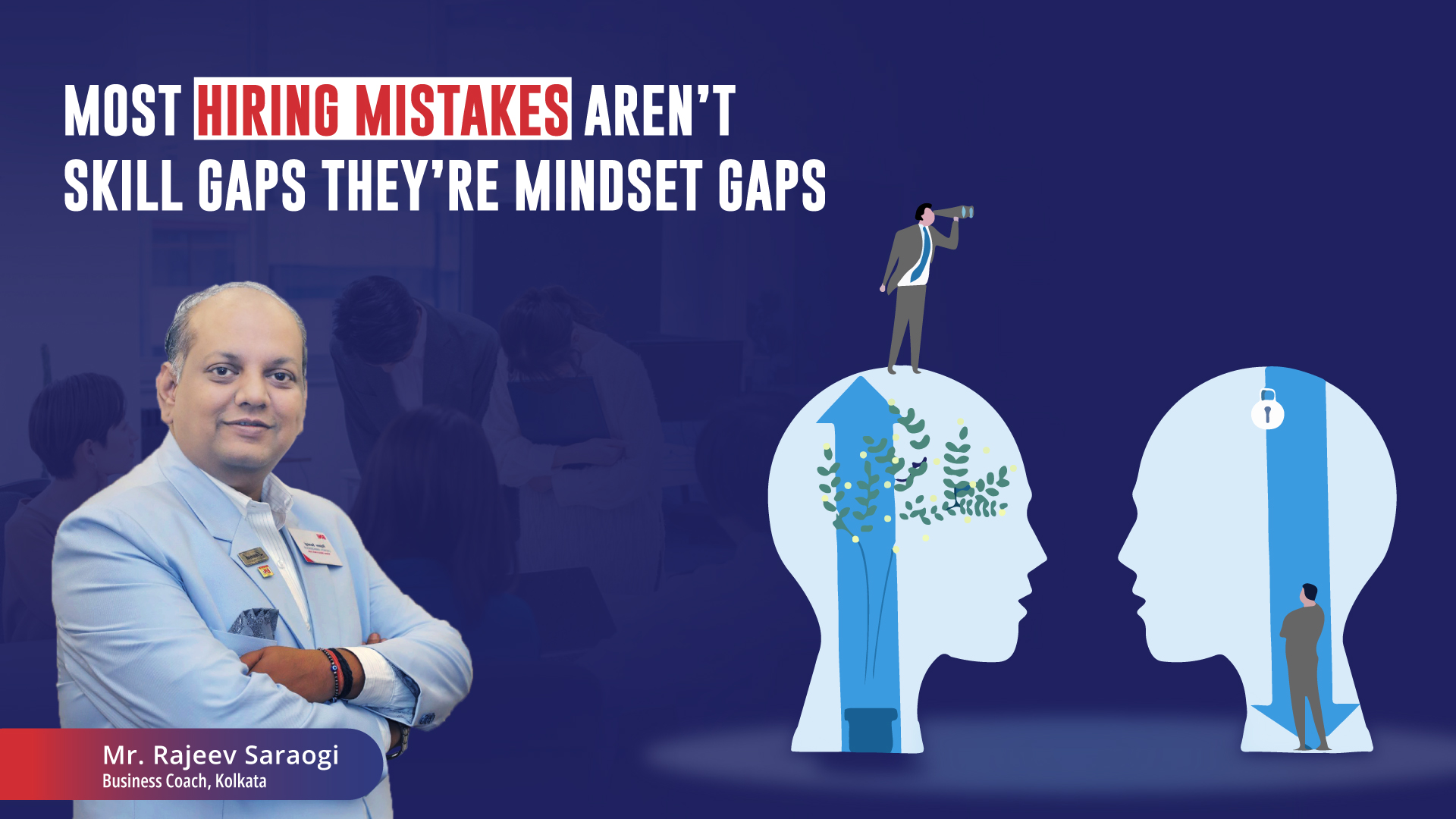
Why Hiring for Mindset Matters More Than Skills for Entrepreneurs
In big, glassed boardrooms and co-working spaces alike, the conversation amongst the group of entrepreneurs often circles back to one pressing concern: Why do some hires with flawless résumés fail to deliver?
Despite ticking every box on paper—degrees, technical skills, years of experience—many new recruits end up clashing with the team culture, resisting feedback, or simply stagnating in roles that demand evolution. And this isn’t just anecdotal. Data shows that 72% of managers say cultural misfits disrupt team cohesion, and 30% of employee exits are attributed to mismatched mindset or values.
The underlying problem? Hiring practices still focus heavily on qualifications and experience, rather than attitude, adaptability, or alignment with company culture. In fast-paced environments where roles shift, priorities change overnight, and resilience is non-negotiable, startups can no longer afford to hire just for skill. They must hire for mindset.
The Résumé Paradox: Why Great on Paper Isn’t Always Great in Practice
Across India’s booming startup ecosystem, companies are discovering that conventional hiring metrics—like college pedigree or years of domain experience—rarely predict on-the-ground performance.
Some of the most unsuccessful hires are those who looked “perfect” on paper but lacked the ability to collaborate, adapt, or embrace a steep learning curve.
Culture Over Credentials: What the Data Tells Us
A lack of structured interviews often leads to superficial conversations and poor hiring decisions. In fact, 60% of bad hires can be traced to weak or informal selection processes that overlooked mindset.
Even job descriptions contribute to the issue. Up to 80% of hiring problems originate from rushed or unclear role briefs, which fail to communicate the values and expectations that matter most.
The Fintech Example: Mindset in Action
Take, for instance, a fast-scaling fintech firm that hired aggressively during a funding round. With demand surging, the company onboarded engineers and product managers with impressive credentials—but little alignment with the startup’s ethos of rapid iteration and ownership.
Within months, deadlines were slipping, conflicts rose, and attrition climbed. The leadership realized that it wasn’t a skill gap—it was a mindset gap. Only those who thrived under pressure, welcomed feedback, and adapted fast were still contributing effectively.
The Rush to Hire: Why Speed Kills Fit
The pressure to scale fast often forces founders and HR teams to move quickly—sometimes too quickly. When speed overrides clarity, companies end up with misaligned hires who struggle to fit in or contribute meaningfully.
A poorly defined role or vague hiring brief doesn’t just slow down a new employee’s productivity; it damages team dynamics and undermines morale.
The Interview Trap: When Charisma Hides Incompatibility
Another mistake? Over-relying on gut feel during interviews. Candidates who speak well, present confidently, and connect personally can sometimes mask underlying mindset misfits.
Without probing questions around resilience, accountability, and growth orientation, interviewers may miss red flags—leading to surface-level hires who aren't ready for the company’s pace or philosophy.
The True Cost of a Mismatched Hire
The numbers speak for themselves. Cultural misfits are responsible for nearly one-third of employee exits. Worse, they ripple through the organisation—lowering team morale, straining managers, and inflating training or replacement costs.
Even when these hires stay, they rarely grow. And in startups where every team member directly affects outcomes, stagnation isn’t just a performance issue—it’s a business risk.
A Growing Shift: Mindset-First Hiring is Catching On
There’s a shift underway. More startups—and even large firms—are now designing their recruitment strategies around mindset indicators: learning agility, collaboration, initiative, and accountability.
According to recent hiring reports, organisations that prioritise mindset during interviews see significantly higher retention, better cultural alignment, and stronger innovation metrics.
What Hiring for Mindset Looks Like in Practice
Mindset-first hiring means moving beyond resumes and portfolios. It’s about:
- Asking scenario-based questions to test adaptability
- Assessing how candidates respond to ambiguity or failure
- Exploring alignment with team values and company mission
- Making cultural fit part of onboarding, not just interviews
Building Teams That Bounce Back: The Power of Adaptive Talent
Teams built with mindset in mind are more than just high-performing—they’re resilient. They recover from failure faster, navigate change more effectively, and often become the backbone of company culture.
Startups that focus on adaptability over rigid qualifications consistently outperform peers in agility, retention, and innovation capacity.
Mindset as the Glue in Modern Workplaces
In a world of hybrid teams, fast pivots, and global competition, mindset is the invisible glue that holds teams together. Skills may get the job done, but mindset determines how people work, grow, and collaborate long-term.
The best founders and HR leaders know this—and are changing how they define “the right hire.”
Conclusion: Hire for Evolution, Not Just Execution
India’s startup ecosystem is growing. But for that growth to be sustainable, companies must build teams that are not just qualified—but aligned, accountable, and ready to evolve.
Mindset isn’t a soft skill. It’s a survival skill. And in today’s economy, hiring for it is no longer optional—it’s strategic
